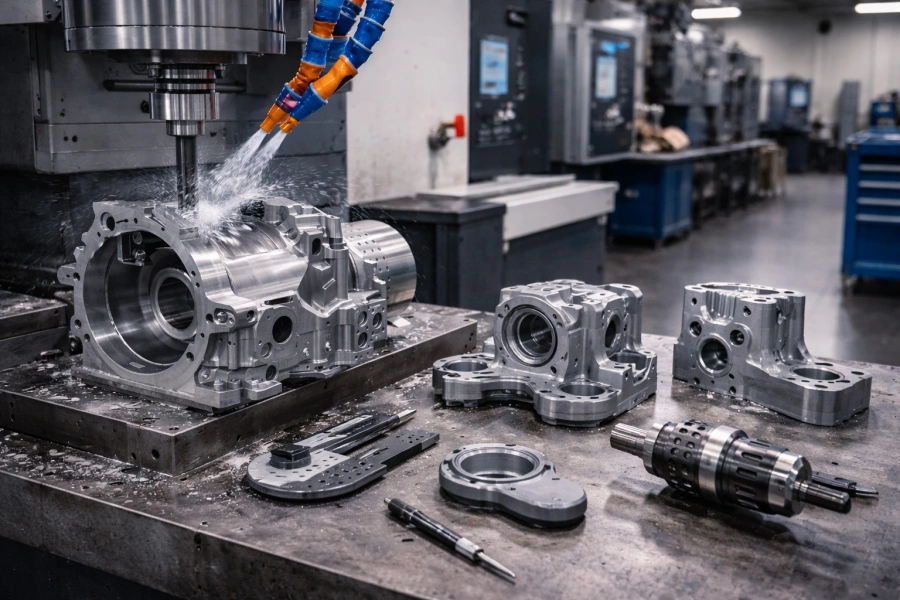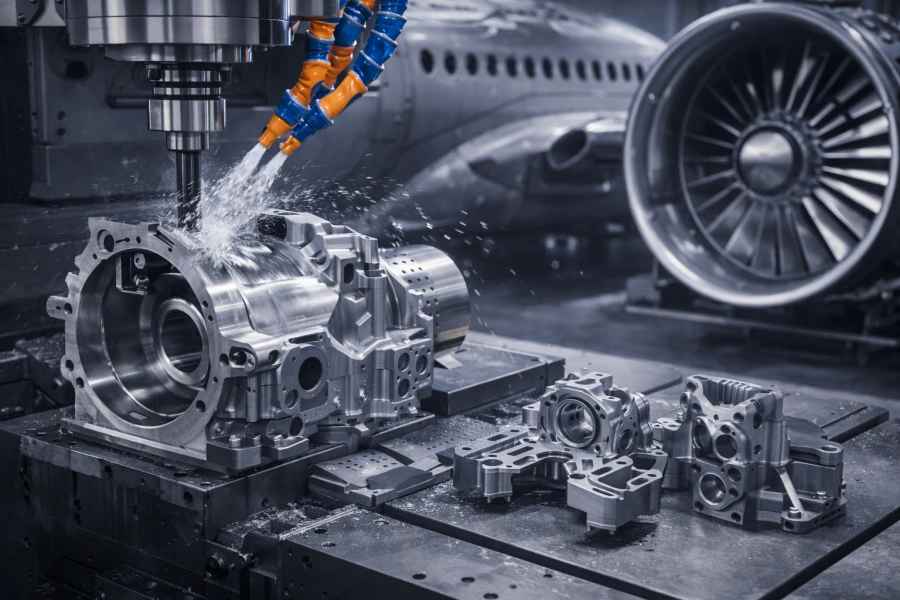Table of Contents
The aviation industry demands uncompromising precision where safety and performance cannot be negotiated. Aerospace metal fabrication stands as the cornerstone of modern aircraft manufacturing, transforming raw materials into critical components that enable flight. From commercial airliners to military jets, every aircraft relies on meticulously crafted metal parts that meet stringent aerospace standards.
Modern aerospace sheet metal fabrication encompasses advanced manufacturing techniques that push the boundaries of engineering excellence. These processes combine cutting-edge technology with decades of industry expertise to produce components capable of withstanding extreme conditions, from high-altitude temperature variations to intense mechanical stresses encountered during flight operations.

Precision CNC machining of aerospace metal components in a modern workshop.
What Makes Aerospace Metal Fabrication Unique?
Aerospace metal fabrication differs significantly from conventional manufacturing due to its extraordinary precision requirements and material specifications. The aerospace industry operates under strict regulatory frameworks, requiring manufacturers to maintain exceptional quality control throughout every fabrication stage.
The materials used in aerospace applications must demonstrate superior strength-to-weight ratios, corrosion resistance, and thermal stability. Titanium alloys, aluminum variants, and specialized steel grades form the foundation of aerospace sheet metal fabrication, each selected for specific performance characteristics that contribute to overall aircraft safety and efficiency.
Manufacturing tolerances in aerospace metal fabrication often measure in micrometers, demanding sophisticated CNC machining capabilities and advanced measurement systems. Every component undergoes rigorous testing protocols to ensure compliance with aviation safety standards set by regulatory bodies like the FAA and EASA.
How Does Advanced CNC Machining Transform Aerospace Components?
Computer Numerical Control (CNC) machining has revolutionized aerospace metal fabrication services by enabling unprecedented precision and repeatability. Multi-axis CNC machines can create complex geometries that would be impossible through traditional manufacturing methods, allowing engineers to design components with optimized aerodynamic properties and reduced weight.
Modern CNC systems integrate advanced software that simulates machining operations before physical production begins. This capability minimizes material waste and prevents costly errors that could compromise component integrity. The ability to machine intricate internal channels, precision holes, and complex surface finishes makes CNC technology indispensable for aerospace applications.
High-speed machining techniques further enhance productivity while maintaining the strict tolerances required for aerospace metal fabrication. These processes generate superior surface finishes that reduce drag and improve component longevity, directly contributing to aircraft performance and fuel efficiency.

Close-up of CNC machining aerospace aluminum parts with high precision.
Why Do Material Selection and Heat Treatment Matter?
The selection of appropriate materials represents a critical decision in aerospace metal fabrication projects. Titanium alloys offer exceptional strength and corrosion resistance but require specialized machining techniques due to their work-hardening properties. Aluminum alloys provide excellent strength-to-weight ratios and machinability, making them ideal for structural components and airframe elements.
Heat treatment processes play a vital role in achieving desired material properties for aerospace applications. Controlled heating and cooling cycles can significantly enhance strength, hardness, and fatigue resistance. These thermal processes must be carefully monitored to prevent distortion or degradation of mechanical properties.
Aerospace sheet metal fabrication services must maintain detailed records of material certifications, heat treatment parameters, and testing results to ensure full traceability. This documentation becomes essential for regulatory compliance and quality assurance throughout the component’s service life.
Which Quality Control Measures Ensure Flight Safety?
Quality control in aerospace metal fabrication extends far beyond dimensional inspection. Non-destructive testing methods, including ultrasonic inspection, magnetic particle testing, and dye penetrant examination, detect internal flaws that could lead to catastrophic failures during operation.

Statistical process control monitors manufacturing variations in real-time, allowing immediate corrective actions when parameters drift outside acceptable ranges. This proactive approach prevents defective components from progressing through the production process, reducing waste and ensuring consistent quality.
Coordinate measuring machines (CMMs) provide three-dimensional verification of complex geometries, ensuring that manufactured components match engineering specifications precisely. These sophisticated measurement systems can detect deviations measured in fractions of millimeters, maintaining the exacting standards required for aerospace applications.
How Do Surface Treatments Enhance Component Performance?
Surface treatments significantly impact the performance and longevity of aerospace components manufactured through metal fabrication processes. Anodizing treatments create protective oxide layers on aluminum components, enhancing corrosion resistance and providing uniform appearance characteristics.
Shot peening processes introduce beneficial compressive stresses that improve fatigue life, particularly critical for components subjected to cyclic loading during flight operations. These surface modifications can extend component service life by preventing crack initiation at stress concentration points.
Chemical treatments and specialized coatings provide additional protection against environmental factors encountered in aerospace applications. From anti-corrosion primers to thermal barrier coatings, these surface modifications enable components to perform reliably in challenging operational environments.
What Role Does Automation Play in Modern Fabrication?
Automation technologies are transforming aerospace metal fabrication services by improving consistency, reducing production times, and minimizing human error. Robotic systems can perform repetitive operations with exceptional precision while maintaining consistent quality across large production runs.
Automated inspection systems integrate seamlessly with manufacturing processes, providing real-time feedback on component quality without interrupting production flow. These systems can detect dimensional variations, surface defects, and material inconsistencies that might escape visual inspection.
Industry 4.0 concepts bring connectivity and data analytics to aerospace manufacturing, enabling predictive maintenance of equipment and optimization of production schedules. This technological integration helps manufacturers meet demanding delivery timelines while maintaining the quality standards essential for aerospace applications.
In Conclusion
Aerospace sheet metal fabrication represents the convergence of advanced manufacturing technology, engineering expertise, and unwavering commitment to quality. As aircraft designs become increasingly sophisticated, the demand for precision-manufactured components continues to grow, driving innovation in fabrication techniques and quality control methods.
The future of aerospace metal fabrication lies in the continued integration of advanced technologies, sustainable manufacturing practices, and enhanced automation capabilities. Manufacturers who invest in cutting-edge equipment and maintain rigorous quality standards will continue to play vital roles in advancing aviation technology and ensuring flight safety for generations to come.
Ready to elevate your aerospace project? Let our expert team provide you with precision metal fabrication solutions.
Contact Information:
- Company: Dongguan Huade Precision Manufacturing Co., Ltd.
- Website: https://hdproto.com
- Email: sales@hdproto.com
